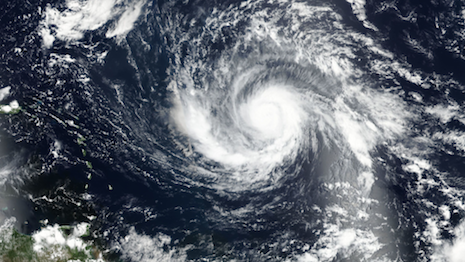 Hurricane Irma moves through the Caribbean. Image credit: Wikimedia
Hurricane Irma moves through the Caribbean. Image credit: Wikimedia
As Hurricanes Irma and Jose continue to ravage the southeastern United States, the full damage is yet to be tallied.
Outside the obvious and most important effect of these storms, the toll on human life, massive storms such as these inevitably have a serious impact on the area’s luxury industries. In particular, Florida's real estate industry and the travel and hospitality sector in the Caribbean will all be facing the effects of these storms for the foreseeable future.
"Travel and tourism are huge drivers to the economy of Caribbean islands and Florida," said Tiffany Dowd, founder and president of Luxe Social Media, Boston. "No doubt there will be a decrease in tourism as visitors seek to find places to travel that were not affected, and places they will feel safe from Mother Nature.
"However, now more than ever, people need to start thinking about planning trips back to the cities and many islands that did not suffer major damage from Hurricane Irma. The Caribbean relies on tourism and many islands such as St. Lucia, Grenada, Barbados, and Antigua are open for business."
Real estate bounceback
When large storms strike, some of the immediate problems are obvious: property damage, flooding and infrastructure problems that will likely make visiting an area a difficult endeavor in the future.
Miami, as one of the main locations hit by Hurricane Irma, has already suffered some of the consequences. The Miami Herald reports that flooding in the streets and a lot of broken windows are some of the immediate problems, but that lasting damage to the city is thankfully minimal (see story).
In a city that relies on its real estate, the lack of catastrophic damage is a serious relief.
CNBC reports that Miami real estate prices are unlikely to take a serious hit in the long run from this storm, as the property damage was not as extensive as elsewhere in the state, such as in the Florida Keys, and that the city is well-prepared for storms such as this (see story).
#Brickell Ave looks like an ocean. Rivers of water taking over Miami's financial district. Unprecedented flooding. #hurricaneIrma #irma pic.twitter.com/ngm9fo1b2x
— marina portnaya (@portnayanyc) September 10, 2017
However, recent reports are showing that the city’s hold on real estate is slipping. For a city whose main bread and butter is real estate, this can be a real issue, which could be dramatically impacted by the impending hurricane.
A report in August from WalletHub ranked Miami at 286 out of 300 cities based on its real estate. Miami Beach saw even worse, ranked at 297. Many experts believe that it is the luxury real estate that is causing the drop, as the number of high-priced properties outnumbers wealthy residents (see story).
In just a few months, Miami will be host to its annual Art Basel event, one of the most popular global art fairs in the world. If the extent of the damage to the city proves to be limited, the event will likely kick off uninhibited this December as planned.
"Hurricanes are not new to South Florida; catastrophic hurricanes are rare," said Chris Ramey, president of Affluent Insights, Palm Beach, FL. "South Florida remains a most attractive real estate investment for Europeans, South Americans and affluent northerners."
Caribbean investments
The Caribbean, unfortunately, was hit much harder and the death toll is tragically much larger than in Florida.
Many of the islands hit, such as St. Barts and the U.S. and British Virgin Islands are havens for luxury tourism and are heavily reliant on the income from wealthy travelers to support their economies.
Many luxury brands have just begun investing in many of these islands and are now having the face the consequences.
For example, Mandarin Oriental Hotel Group is rebranding and managing a hotel on Canouan Island in Saint Vincent and the Grenadines, marking the hotelier’s entry into the Caribbean.
The resort, which will become Mandarin Oriental, Canouan in November, provides a secluded getaway for guests while also allowing them access to outdoor activities such as sailing and fishing. This year, Mandarin Oriental has announced plans to bring its brand to new destinations, including South America, Australia and Dubai, United Arab Emirates (see story).
The Mandarin Oriental resort in Saint Vincent. Image credit: Mandarin Oriental
Luckily, Saint Vincent was one of the islands that was less affected.
Other islands however, took much more serious damage. Barbuda, a popular tourist destination known for its moderate climate and home to many luxury resorts, suffered immense damage in Hurricane Irma’s wake, with almost the entire population evacuated to other islands.
In addition to the tragic loss of life, this storm and the currently ongoing Hurricane Jose represent a significant hit to the Caribbean’s luxury tourism industry, which is vital to the livelihood of many in the islands.
As Hurricane Irma subsides, Hurricane Jose is still making its way past the Bahamas, potentially leading to even more damage. More time is needed before the full scope of the damage can be assessed, but it is safe to assume that both the Caribbean and its luxury hospitality industry have taken a massive blow.
"The luxury travel industry is resilient," Ms. Dowd said. "It will take time to recover, but no doubt, the hotels and resorts affected will come back stronger than ever.
"The Caribbean Hotel and Tourism Association (CHTA) has launched a 'One Caribbean Family' initiative where people can donate to support the Caribbean Tourism Recovery Fund."

